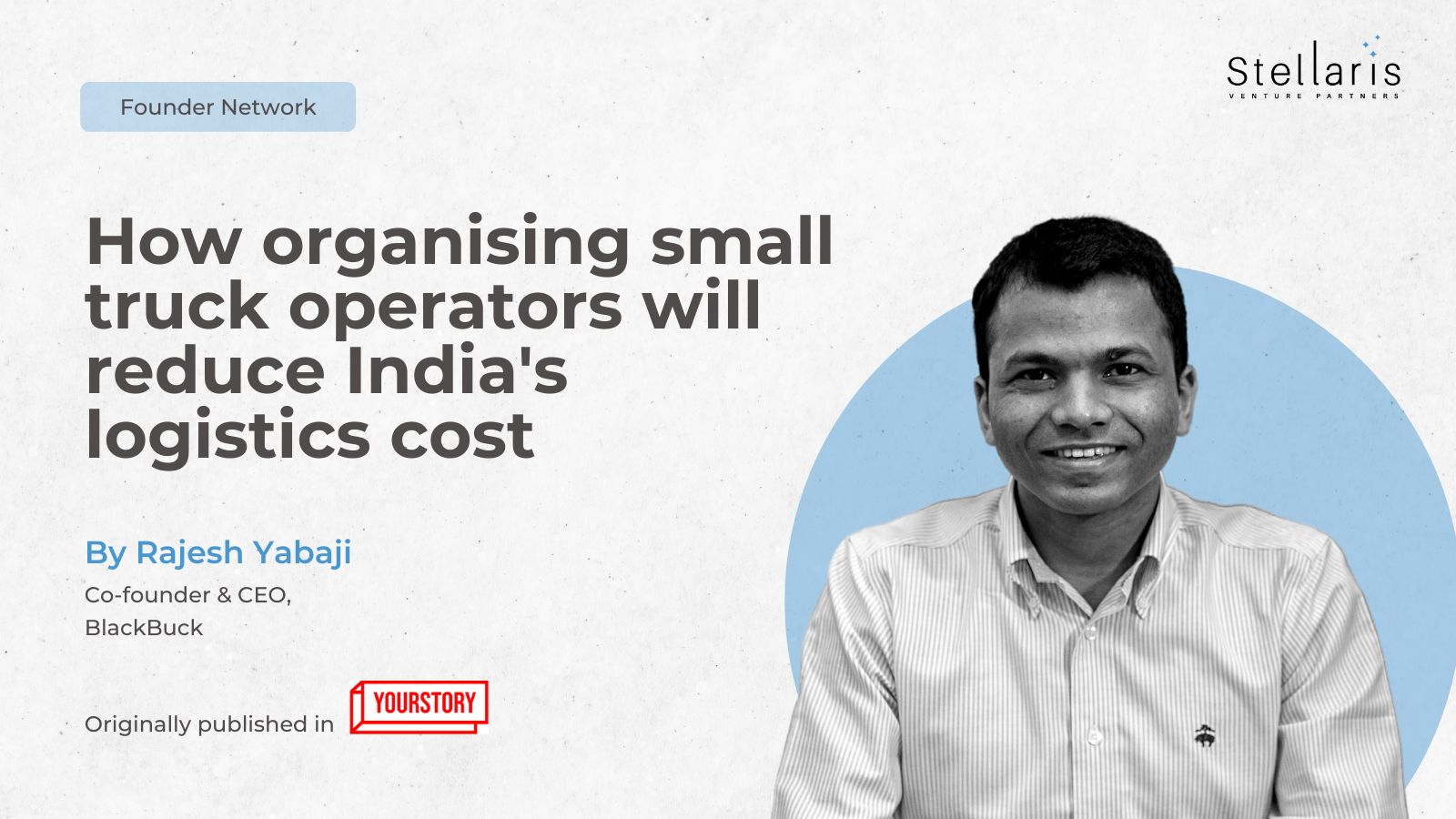In India, small fleet operators fulfil 85% of India’s logistics needs. Although the backbone and crucial player in the logistics economy, the trucking industry is riddled with inefficiencies.
The Indian government will announce the much-awaited National Logistics Policy this week, which will enable India to be on par with countries like the US and UK when it comes to logistics costs.
At an estimated 14% of GDP, India’s logistics cost is particularly higher than the rest of the world.
While it is welcoming to see proactive dialogues around policy changes and infrastructure upgrades, the problems of high cost and highly unreliable logistics in the country are deep-rooted in the inefficiencies of the trucking ecosystem.
The Indian logistics economy is dominated by road freight. The small fleet operators who own less than five trucks drive 85% of India’s logistics needs, becoming the backbone and crucial player in the logistics economy. However, the trucking industry is riddled with inefficiencies.
Challenges at hand:
Poor asset utilisation: Most trucks, on average, run 15-16 days of the 30 billable days. However, 100% utilisation of assets is practically impossible in this segment primarily because finding a load is difficult. It takes one to three days to get a load, and a lot of trucks end up running empty on roads with no return loads.
Dependency on intermediaries: There are at least 2.5 intermediaries between a truck operator and a shipper while making a transaction. Typically, truckers lose 15-20% of their earnings to these intermediaries before the final payment comes through. So, how do we find a better way to help a truck operator get better realisation in his business?
High operating costs: Truck operations come at a high cost for a small fleet operator. It involves buying a truck at a high-interest rate (between 40-60% from local moneylenders), hiring drivers, tracking the trucks, and managing payment leakages for fuel or tolls. The ability to manage a truck using efficient methods is non-existent.
To streamline India’s $300 billion logistics industry, we need to get down to the brass tacks and narrow our lens to a truck operator’s demography, including their ownership, efficiency, how they get a load, the number of days they drive in a month and manage their operations.
The answer to these fundamental questions will majorly decide the path to making India’s logistics efficient.
Solving for the small operator
Small fleet operators in India are largely uneducated and ignored. In fact, they are not part of the formal economy and don’t even remotely participate in the digital economy.
Concerted efforts must go into unlocking the efficiencies of this segment — helping small fleet owners better utilise fleet, achieve optimal diesel consumption, reduce carbon footprint, better manage payments, increase revenues, and most importantly, uplift their overall socio-economic status by bringing dignity and pride to the overall trucking community.
Digitisation of small fleet operators is the need of the hour for India. However, digitising a trucker—sitting in a remote village in India and conducting his business in the most traditional way possible for decades—is easier said than done and involves investing time and resources.
In trucking, digitisation at scale can only be done with a solid distribution network. BlackBuck has deployed resources across 1.5 lakh+ villages in India to build awareness, educate, and handhold truckers and help them develop trust in digital transactions.
It is just the tip of the iceberg. India has truckers residing across six lakhs villages, and we need more concerted efforts to get to them.
Similarly, you have to build a highly customised digital product for a trucker. A fleet operator, unlike your urban consumer, is not willing to invest in a product or service for the sake of convenience.
This customer is struggling daily to make his ends meet. He will try only those products that make his unit economics improve directly.
As we design products for such Bharat users, we need to constantly ask if we are solving the right problem for them and improving their business. Are we addressing the trust factor? Is our 24×7 service reliable? Can my customer reach out to my team even at 3 AM? And, finally, is my product available in their language of convenience?
The moment a customer realises your solution is available in their native tongue, and it is trustworthy and directly impacts the P&L, they are ready to embrace your product or app.
Impact of digitisation
Digitisation of trucking can have a profound impact on the individual, community and nation. A well-optimised digital freight network can empower a truck operator to better utilise his assets, reducing the idle time by 40-50% and improving earnings by 20-30%. Similarly, moving trucking operations online can dramatically reduce cash leakages and fuel pilferages, helping truck operators save at least 10-15% of their operating costs.
Digitisation not only has a direct impact on the revenues of fleet operators and their drivers but also has the power to impact the prosperity of their families.
Going beyond communities, the digitisation of trucking can also play a key role in bolstering India’s decarbonisation mission.
According to a recent report released by Niti Aayog and RMI India, road freight is the biggest contributor to carbon emissions—responsible for 95% of the freight CO2 emissions in India.
After unloading, a trucker has to travel 100-500 kms empty to find his next load or return empty.
An efficient discovery and match-making platform can enable truckers to find their next load faster in their vicinity, cut down empty miles by half, and significantly reduce carbon emissions.
Truckers are at the heart of India’s logistics. If technology solutions can pervade every aspect of a trucker’s life and bring high efficiencies into this ecosystem, it can change the face of logistics in India.
Modernisation in this rickety old industry can bring a paradigm shift in perception. If done right, it can inspire a whole new generation to join the trucking business, shake up the old world order, and steer the future of road transportation in India.

